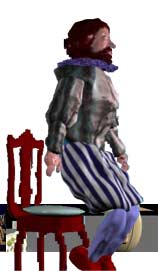|
|
Greg Bringman: Your father was Sir Nicholas Bacon and your Mother, a Calvinist, was Anne Cooke. Your mother was the sister in law of William Cecil, Lord Burghley.
Sir Francis Bacon: Yes, my uncle was the most powerful statesman in Elizabethan England. I was born into a well-to-do family, to say the least.
GB: You attended Trinity College at Cambridge.
FB: You are correct. I studied rhetoric and philosophy under Dr. John Whitgift, who became the archbishop of Canterbury.
GB: and then studied law at Gray’s Inn.
FB: Yes, beginning in 1579.
GB: In 1597, You published the first edition of the Essays a humanist rhetorical exercise.
FB: Yes, just after Montaigne’s. I am a little bit nostalgic for
the first edition of my Essays. I romanticize their nascent format. I
had their rhetorical format worked up to a science by the time the second
and third editions came out.
GB: You practiced law and you authored one of many works, a reform of English Law.
FB: Yes I was working on the Reform of English Law between 1622-1626. I was also at this time writing a series of political tracts.
GB: You were also working on the New Atlantis at this time.
FB: Yes. The ideal scientific community.
GB: A few theoretical questions that relate to the practice of science.
FB: OK
GB: The French social theorist , August Comte
introduced Positive philosophy as part of human social evolution, a philosophy
that would do away with, in order to effect scientific progress, theological
and metaphysical concerns, previous stages of this social evolution.
In calling for progress in social evolution, you however emphasized invention,
imagination, and the technologist’s ingenuity , in figuring out (in a scientific act) nature’s
inner machinery.
FB: Yes I haven’t met Comte but I do not feel that the... positive
philosophy?
GB: part of a social physics
FB: Ah yes... that this positive philosophy
should necessarily replace theological and metaphysical concerns. I have
a Faustian will for the pursuit of knowledge of nature that is in no
way contrary to religion. I don’t want to get sidetracked, If I
understand you correctly, you are interested in my plea for imagination
in the sciences, which D.S.L. Cardwell, the history of technology writer,
suggests I was responsible for, although sometimes I equate all of Intellectual
practice with a type of bureaucratic, Roman Senatorial work. But, Baconian,
scientific empowerment through imagination comes from my background as
a literary artist in addition to being a philosopher. As you know I am
fully versed in the Latin Language and the art of rhetoric. Because,
Latin was the universal language of the Renaissance and being also well
suited for the inductive method, it feeds back into my scientific practice.
The Positivists who exclude literary works have their hypothetical empiricism
that one would think uses imagination; I am interested in the use of
induction in scientific theory and the humanities to transpose imagination
(in generalization) onto research.
GB: You also call for a science of science implemented through our universities
FB: Yes, in calling for a reconstruction of
the sciences, arts, and all human knowledge, I am similar to reflexive
sociologists who want to restructure science through making a sociology
of science--in order to in turn make that science more valid. We have
a model for human cultural perfection in the mechanical arts and sciences,
and there is one reason for this, their cooperative efforts in their
discipline. The intellectual science of philosophy, in the university
system, I have said, is “barren of works”, and this is because
it is not as cooperative, relying on mostly upon wit. While reflexivity
is first exercised by the individual, the group could really make intellectual
science more valid.
GB: Explain your concept of idols, as it shows your dystopian side.
FB: Well first of all , in general there are
idols of the mind, fictions and superstitions that block human understanding.
The mind creates false appearances that to it are false reasoning. For
instance, humans see analogies in everything and generalize from only
a few instances or experiences. Other specific false appearances occur
in human habits, our customs are shadowy enclaves enclosing our spirits.
I have also postulated the idols of the tribe or human physical limitation,
idols of the the theatre (controlling thought like Aristotle’s),
and the idols of the Market Place (the ambiguities in language that cause
disputes over words).
GB: On those words we’ll have to end. You are certainly not arrogant,
as some of your biographers claim-- Thank you
Francis Bacon.
FB: Thank you. ( In my old age I have adapted to the
reflexive habits of contemporary philosophy).
|
|
|

